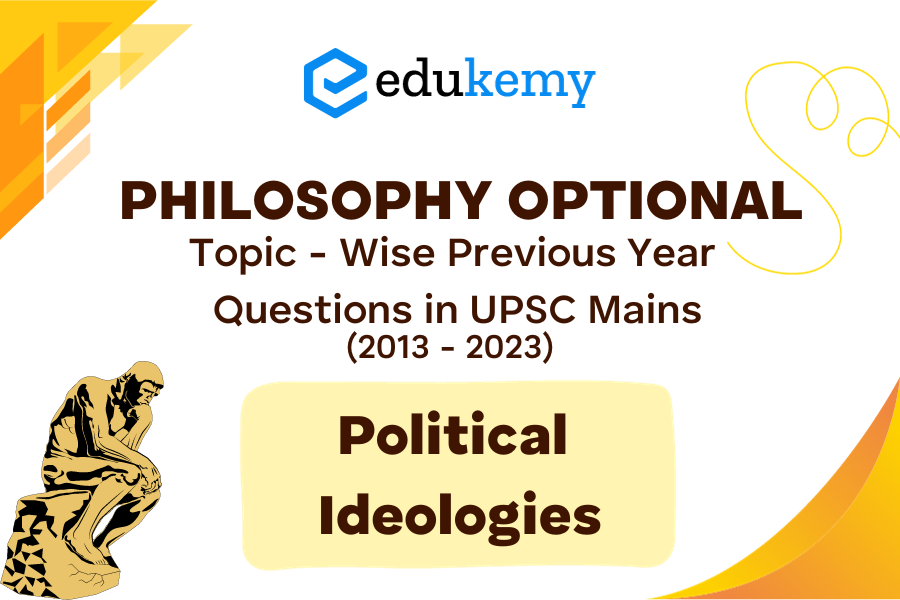
Are you an aspiring civil servant preparing for the UPSC Mains examination with Philosophy as your optional subject? If so, you’re well aware of the critical role that political ideologies play in shaping the world we live in. The 21st century has seen significant shifts in political thought, and understanding these changes is crucial for acing the Philosophy paper. In this blog series, we will delve into the treasure trove of previous year questions from 2013 to 2023 to help you master the intricacies of Political Ideologies.
From classical liberalism to post-modernism, the world of political ideologies has witnessed dynamic transformations, and the UPSC has consistently recognized the importance of these shifts in their question papers. Our journey through these previous year questions will not only help you grasp the evolving landscape of political thought but also equip you with the tools needed to tackle contemporary issues in your exam. So, if you’re ready to explore the philosophies that shape governments and societies, and gain valuable insights into how to excel in your UPSC Mains, stay tuned for a comprehensive analysis of Political Ideologies in this series.
Contents
- 1 Political Ideologies Philosophy – Previous Year Questions (UPSC CSE Mains History Optional)
- 2 FAQs on Political Ideologies
- 2.1 1. What is Political Ideology?
- 2.2 2. Who is Andrew Heywood, and why is he significant in the study of political ideologies?
- 2.3 3. What are the major political ideologies discussed by Andrew Heywood in his works?
- 2.4 4. How do political ideologies impact real-world politics?
- 2.5 5. How can a clear understanding of political ideology definitions benefit students and individuals interested in politics?
- 3 In case you still have your doubts, contact us on 9811333901.
Political Ideologies Philosophy – Previous Year Questions (UPSC CSE Mains History Optional)
1. Discuss in the context of Anarchy whether the freedom of anindividual is consistent with the sovereignty of the state ? (2017/10)
2. Does Marxism curb individual freedom in the name of protectingsocial justice ? Discuss (2017/20)
3. Political ideology of Anarchism. (2012/12)
4. What are the basic differences between Marxism and Socialism?2011 – 20 marks
5. Can it be said that Socialism is a weaker version of Marxism?Discuss. 2011 – 20 marks
6. Is Democratic Socialism a contradiction in terms? Discuss. 2011 – 20marks
7. Which type of socialism, according to you, is superior – utopian ordemocratic? Why? 2010 – 20 marks.
8. Critically examine – ‘Acceptance of the authority of the state isinconsistent with the highest duty of mankind, “the duty to actautonomously”’ (Robert Paul Wolff). 2007 – 20 marks.
9. Describe your understanding of socialism. Must it be defined innormative terms of a set of values and ideals which socialists seekto realize, or in descriptive terms of the specific economic andpolitical institutions of socialist society? Can the tension betweenthe two be adequately resolved? Discuss. 2007 – 60 marks.
10. Critically examine – ‘Acceptance of the authority of the state isinconsistent with the highest duty of mankind, “the duty to actautonomously”’ (Robert Paul Wolff). 2006 – 20 marks.
11. Describe your understanding of socialism. Must it be defined innormative terms of a set of values and ideals which socialists seekto realize, or in descriptive terms of the specific economic andpolitical institutions of socialist society? Can the tension betweenthe two be adequately resolved? Discuss. 2006 – 60 marks.
FAQs on Political Ideologies
1. What is Political Ideology?
Political ideology is a set of coherent and interconnected ideas and beliefs that provide a framework for understanding and shaping political matters. These ideas often encompass views on government, society, economy, and individual rights.
2. Who is Andrew Heywood, and why is he significant in the study of political ideologies?
Andrew Heywood is a renowned political scientist and author of several widely used textbooks in political science. He has made significant contributions to the field of political ideologies, making complex theories and concepts more accessible to students and scholars alike.
3. What are the major political ideologies discussed by Andrew Heywood in his works?
Andrew Heywood covers a broad range of political ideologies in his writings, including liberalism, conservatism, socialism, feminism, environmentalism, nationalism, and more. These ideologies are analyzed in depth, providing insights into their origins, core principles, and historical development.
4. How do political ideologies impact real-world politics?
Political ideologies influence the policies and actions of governments, political parties, and movements. They shape the way societies are organized, the role of the state, and the distribution of power and resources. Understanding these ideologies is crucial for comprehending the dynamics of politics in different countries.
5. How can a clear understanding of political ideology definitions benefit students and individuals interested in politics?
A clear understanding of political ideologies enables individuals to engage in informed political discussions, make informed voting decisions, and analyze the implications of government policies. It also helps students and scholars of political science to critically evaluate and compare different political systems and movements.
In case you still have your doubts, contact us on 9811333901.
For UPSC Prelims Resources, Click here
For Daily Updates and Study Material:
Join our Telegram Channel – Edukemy for IAS
- 1. Learn through Videos – here
- 2. Be Exam Ready by Practicing Daily MCQs – here
- 3. Daily Newsletter – Get all your Current Affairs Covered – here
- 4. Mains Answer Writing Practice – here

